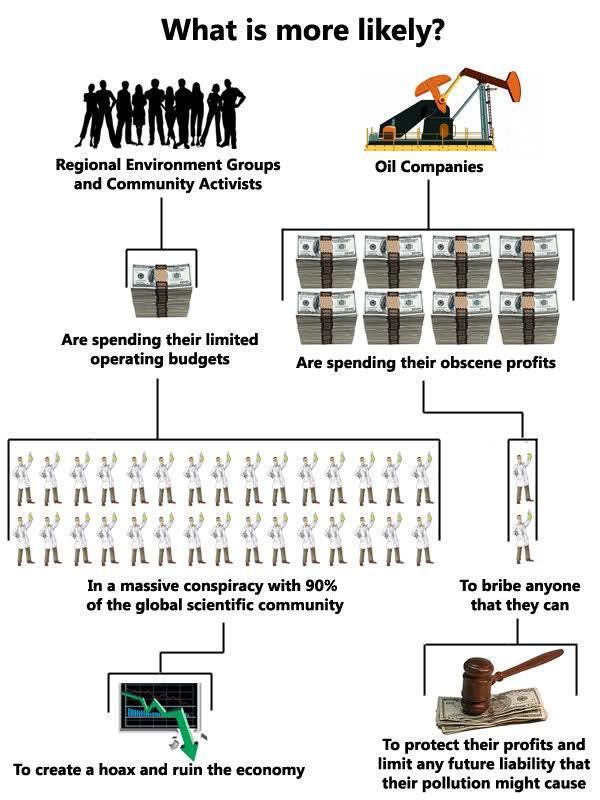It's not a finding of science
Yes it is - or, more precisely, it's many findings, derived from a plethora of observations and masses of data collected and analyzed over periods of decades now by innumerable researchers. Of the few "doubters" who are, in fact, subject matter experts most owe their livelihoods to their supposed skepticism.
Um, not by a long shot. Geologists (I live in a house full of them) note that CO2 has very weak, if any, correlation to temperature in the geological record. We've gone into ice ages with CO2 levels 10 to 15 times higher than present, and we've been much hotter with low CO2 levels. Those are
observations. We go through ice ages timed by the Milankovitch cycles, and no one has yet suggested how animals and plants could somehow anticipate our orbital mechanics and die at the appropriate time to produce a CO2 drop).
These are observations, and they conflict with global warming theory, so a small band of scientists (usually called "The Team") worked to change the facts, in one case using a single tree as a temperature proxy for all of Eurasia (the tree now has a really nice plaque!) In their leaked e-mails, they desperately avoided questions from a botany professor who explained that pine trees can't be used as temperature proxies. Perhaps that's why in their hockey stick graph, they had to hide the last part of their tree-ring record, because it showed temperatures
dropping since the mid-20th century. That was what the quote "Hide the decline" referred to.
Many of the scientists who worked on the IPCC report resigned, such as Chris Landsea, and upon investigation, it turned out that about 30% of the IPCC report comes straight from non-peer reviewed papers written by advocacy groups. That's how Pauchuri got burned on the disappearing Himilayan glaciers.
No skeptics make their livelihood from skepticism. As I pointed out, even the leading skeptics like Anthony Watts get perhaps a coffee mug. Conversely, the alarmist scientists are getting grants worth hundreds of millions of dollars, get millions from speaking (James Hansen has had to defend himself because he personally raked in over a million dollars from alarmists while a public employee of NASA).
There is, of course, no shortage of gullible consumers of this bogus skepticism as it confirms and supports their political prejudices and agendas.
Um, talk about gullible. Would you care to explain how scientists determined what the optimum average temperature of our planet actually
is? I'll wait while you look that up.
*waits*
Oh, they skipped that step. Geologists would go with the Eocene maximum, when the Arctic was 73F, monitor lizards lived in Greenland, the Antarctic had forests, while Canada had palm trees and the same yearly average temperature that Florida does now. Geologists call it "the Eocene Optimum" because life flourished everywhere. The big mystery is that the tropics weren't much hotter than today, either. It's like the whole planet was warm and happy, like Hawaii writ large. Climate models can't reproduce it. They can't even come close, which tells you how good climate models are (Garbage in - garbage out).
No, they didn't do any studies to figure out what an optimal temperature might look like (and can't even figure out why the Eocene was so nice), but since their notion was that man was causing climate change, they just assumed the change would have to be a world-ending catastrophe of Biblical proportions. End of Days stuff.
The rest was finding evidence of actual, unambiguous change, which they couldn't so they made stuff up ("Which is what half of the interesting East Anglia e-mails are about), and then convincing everyone that they were right. They couldn't do that either, so they started blacklisting scientists and getting journal editors fired. They even said they would redefine what "peer-reviewed" literature is so they could dismiss anything they didn't like as appearing in a "non-peer-reviewed" journal. That's what the other interesting half of the East-Anglia e-mails are about.
When all the evidence is on your side, you don't have to resort to fraud, forgery, and chicanery. That they did so convinced more people, including many formerly alarmist journalists, that the skeptics were right than anything the skeptics ever said. It even convinced prominent and highly-respected climate scientist Judith Curry to meet skeptics half-way and look at what her field had become. Of course she was immediately branded a witch by believers.
You'd think the field wasn't even remotely connected to science, because in real science, scientists present and debate evidence and experiments, with standards like open access to data, repeatability, etc. In climate science they conduct progroms to expose and denounce heretics.
Of course in science a theory also has to be at least theoretically falsifiable, but to date nobody has come up with a hypothetical measurement or event that would disprove global warming. That's why you can't name one which I can't dismiss with a paper from the alarmist camp.





